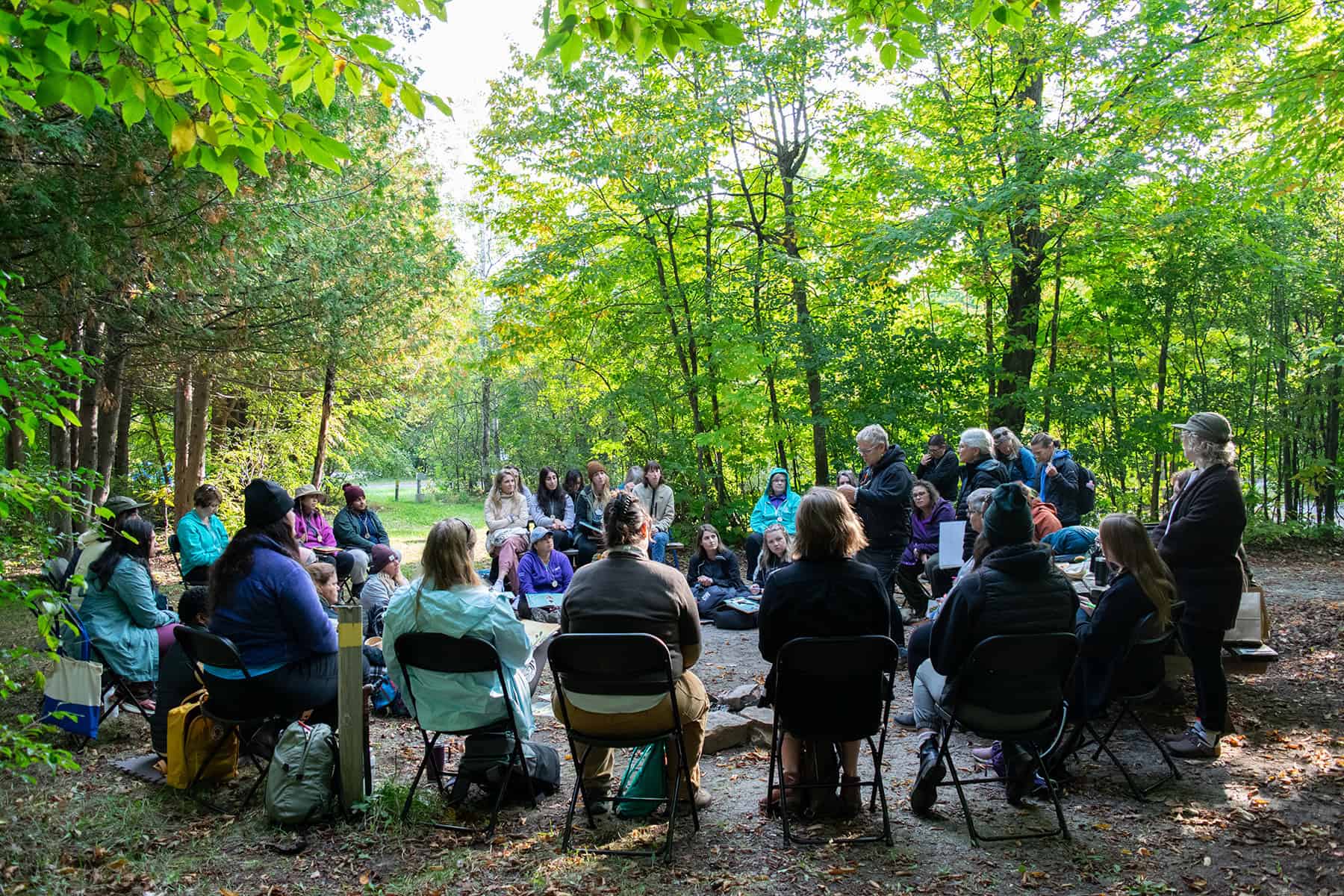
A global PhD network for research and collaboration: Supporting future researchers in school-based outdoor learning and teaching – Part I
Thank you to Mads Bølling, PhD from (Center for Clinical Research and Prevention) and Karen Seierøe Barfod, PhD (VIA University College) for providing this post on behalf of the international network of PhD Students in School-based Outdoor Learning and Teaching.
Part I – A global PhD network for research and collaboration: Delegating the future researchers in school-based outdoor learning and teaching
In this first of three blog posts, we introduce an international PhD network that creates space for thematic peer exchange across institutions and borders. We explore how the network emerged, what it offers its members, and how it supports both individual development and a collective research culture in outdoor learning and teaching. The next two posts will explore emerging research trends from the network’s PhD projects and reflect on the broader value of cross-institutional collaboration.
School-based outdoor learning and teaching is a growing but relatively small research field compared to larger domains such as STEM (Science, Technology, Engineering, Maths) education or inclusive pedagogy. Research groups tend to be smaller, and PhD students may find themselves working in isolation, without direct thematic peer collaboration. While most universities and research institutions provide opportunities for PhD students to take part in methodological or target-group-specific discussions, thematic peer support – engaging with others researching the same concepts and theories – is often lacking. However, this kind of thematic exchange is essential. It strengthens research quality, provides comparative insights, and supports early-career researchers in navigating their academic journeys and building networks – an investment for future international collaboration.
While PhD programs primarily establish formal networks through institutional exchanges, informal peer networks across institutions and national borders offer a valuable complementary approach. Such PhD networks extend professional networking beyond institutional structures, providing opportunities to accelerate PhD students’ academic careers. In this way, such networks function simultaneously as both “bonding” (deepening connections within a shared research area) and “bridging” (building links across disciplines and research traditions), as conceptualized by Putnam (2000). By fostering both close-knit collaborations and broader interdisciplinary connections, PhD networks help create a more integrated and resilient research environment in outdoor learning and teaching.
The value of a global PhD network on outdoor learning and teaching
To strengthen informal connections, the independent network “PhD Students in School-based Outdoor Learning and Teaching” was established in 2023 by Danish senior researchers Karen Barfod and Mads Bølling. This network has only been possible due to the enthusiasm and commitment of PhD students from around the world and today includes 18 current PhD students and upcoming researchers in the field from various institutions worldwide.
According to PLaTO-Net terminology, teaching and learning taking place outdoors in a school setting is difficult to conceptualise due to different traditions. In the context of this PhD network, the notion of ‘school-based’ is informed by the PLaTO-Net’s definitions of ‘outdoor learning’, ‘outdoor teaching’, and ‘outdoor education’ (Lee et al. 2022, Table 2).
The goal of the ‘PhD Student School-based Outdoor Learning and Teaching Network’
The network serves as a platform for knowledge exchange, academic reflection, and methodological discussions. One takeaway from establishing the network is the importance of remaining open to opportunities and emerging questions along the way. By connecting PhD students across different institutions and countries, the network has facilitated discussions on research design, theoretical frameworks, and the unique challenges of studying and implementing outdoor learning in diverse contexts. In this way, the network introduces a modest shift in the academic environment of the participating PhD students by bringing together different epistemological and ontological perspectives for dialogue and mutual exchange. That is, PhD students with different understandings of research, underlying assumptions about reality, and methodological approaches meet and share ideas. It provides a supportive space where PhD students can openly share both their enthusiasm and frustrations, helping to cultivate a collaborative environment that supports their professional growth.
Challenges amongst outdoor learning and teaching emerging researchers
Presenting and discussing ongoing work can be sensitive and vulnerable for students. For example, students may wrestle with questions on how to navigate biases in schools known to influence the study population. Questions may arise on how to ensure consistency in a solitary qualitative analysis and bring hidden aspects to light. These challenges require open and honest discussions. Together, we must foster an environment of trust and openness to support emerging researchers in addressing these complexities.
The current state of the network
The network has grown, expanding through snowball effects but is open for more participants, which is one of the reasons for writing this blog post. The network is additionally having discussions on whether the network should be exclusively for PhD students, or also include former members – e.g., early-career researchers who were previously part of the group. Other questions this network is exploring include: How should new members be onboarded? What should the structure look like, particularly when considering the best times to meet with participants from different time zones across the globe? These ongoing discussions highlight the dynamic nature of building and sustaining a research network.
Today, the network hosts regular online meetings 10:30 UTC to include both Canadian, Australian, and European members, facilitating collaborative research discussions, and connecting PhD students with senior mentors and peers who share their research interests. The network has so far met online nine times. Senior researchers have also been pushing for conferences to include PhD students’ sessions on the outdoor field, to give the network a physical presence (e.g. at the EOE (European Institute for Outdoor Adventure Education and Experiential Learning) Conference in 2025 in Rimini, Italy.
Following blog posts II and III: The frontier of outdoor learning and teaching research
This PhD network reflects the current trends and priorities in outdoor learning and teaching research. The topics explored by participating PhD students highlight both national funding trends and global research directions. One of the key insights emerging from the network is how national regulations, cultural traditions, and educational paradigms shape outdoor learning and teaching research in different countries. In comparative education research it is well established that studying practices across different contexts can provide deeper insights into one’s own approach. The network, therefore, does not just support individual researchers – it also helps develop a more comprehensive, global understanding of outdoor learning and teaching.
To learn more about how you can get involved with the PhD Student School-based Outdoor Learning and Teaching Network, contact Mads Bølling at: mads.boelling@regionh.dk and/or Karen Barfod at: ksba@via.dk
This blog post is the first in a series of three consecutive posts. In this first part, we have focused on the rationale behind establishing an international PhD network in school-based outdoor learning and teaching, and the value of creating thematic peer support across institutions and countries.
In the next two blog posts, we will turn to the research front itself: Blog II will highlight four current trends in school-based outdoor learning, as explored across the PhD projects in the network. Blog III will present three additional research perspectives and conclude the series with a reflection on the research frontier and the broader value of PhD networks as cross-institutional incubators for shared academic identity, collaboration, and innovation.
PhD students and early-career researchers in the network who are contributing to the blog series
Anastasia Bengry (University of Derby, United Kingdom)
Katrine Bergkvist Borch (University of Southern Denmark, Denmark)
Marie-Claude Beaudry (Université de Sherbrooke, Canada)
Amanda Cheree (University of New England, Australia)
Antoine Deschamps (Université de Sherbrooke, Canada)
Elena Diana (University of Pisa and University of Florence, Italy)
Dorte Eggersen (VIA University College & Aarhus University, Denmark)
Kirsten Føns (Ilisimatusarfik – University of Greenland, Greenland)
Lisa Frances (University of New England, Australia)
Trude Iversen (University of Stavanger, Norway)
Yannick Lacoste (Université du Québec à Montréal, Canada)
Salvatore Laneri (University of Palermo, Italy)
Gabriele Lauterbach (University of Stavanger, Norway)
Kassandra L’Heureux (Université de Sherbrooke, Canada)
Theres Mühlberg (Technical University of Munich, Germany)
Tommaso Reato (University of Padua, Italy)
Emilie Skoglys (University of Agder, Norway)
Marie C. Vermund (University of Copenhagen, Denmark)
References
Lee, E. Y., De Lannoy, L., Li, L., De Barros, M. I. A., Bentsen, P., Brussoni, M., … & Tremblay, M. S. (2022). Play, learn, and teach outdoors—Network (PLaTO-Net): Terminology, taxonomy, and ontology. International Journal of Behavioral Nutrition and Physical Activity, 19(1), 66.
Putnam, R. D. (2015). Bowling alone: America’s declining social capital. In The city reader (pp. 188-196). Routledge.

